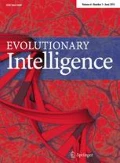
Alan Turing was seemingly the first person to suggest that natural evolution may provide inspiration for approaches to artificial intelligence, in the famous “Intelligent Machinery” report he produced in 1948 (e.g., see [1]). The first implementations of such evolutionary computing emerged during the following decades (e.g., see [3]), including pioneering work in the UK by Richard Forsyth with his BEAGLE system [4]. The first event dedicated to evolutionary computing in the UK was held as part of the Society for the Study of Artificial Intelligence and Simulation of Behaviour (AISB) 1994 Convention in Leeds, organised by Terry Fogarty. The workshop continued to be held at the annual convention for a number of years thereafter, with the proceedings, entitled Evolutionary Computing, published by Springer each year (e.g., see [2]).
2014 marked the 50th anniversary of the AISB’s annual convention with an event at Goldsmiths, University of London. It was also the 20th anniversary of that first evolutionary computing workshop and so a one-day symposium was held as part of the AISB’s 2014 event. The special issue contains a selection of extended papers from the symposium. My thanks to all those involved in the symposium and this special issue.
References
Copeland BJ (2004) The essential Turing. Oxford University Press, Oxford
Fogarty TC (1994) Evolutionary computing. Springer, Berlin
Fogel DB (1998) Evolutionary computation: the fossil record. IEEE Press, USA
Forsyth R (1981) BEAGLE: a Darwinian approach to pattern recognition. Kybernetes 10:159–166
Author information
Authors and Affiliations
Corresponding author
Rights and permissions
About this article
Cite this article
Bull, L. Foreword. Evol. Intel. 7, 133 (2014). https://doi.org/10.1007/s12065-014-0122-6
Published:
Issue Date:
DOI: https://doi.org/10.1007/s12065-014-0122-6

